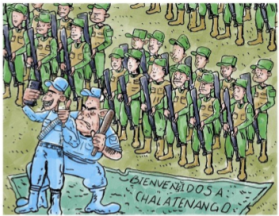The United States Drug Enforcement Agency in Central America
In May and again in June agents with the US Drug Enforcement Agency (DEA) were involved in killings in Honduras. The killings come as the United States continues to ramp up the drug war in Central America, a region that has become a major drug-trafficking route since Mexico launched a major offensive against trafficking organizations backed since 2008 by millions of dollars of US funding.
The shootings in May killed two pregnant women and two others. The United States has denied that the DEA agents, part of a commando-like Foreign-deployed Advisory Support Team (FAST), fired the shots which killed the pregnant women. Instead, Honduran law enforcement officials working alongside the DEA were at fault, State Department spokesperson Victoria Nuland has said. Witnesses have contradicted that claim. But the DEA has taken responsibility for shooting and killing a man in a drug raid in June. Admitting that a DEA agent had shot the man, the first such admission after several firefights in which the DEA unit has been present, an official from the US Embassy in Honduras claimed the agent fired in self-defense.
Military advisers and foreign funding to support police and military units has a familiar and dissonant ring in Central America, where the United States funded and provided training in fighting against peoples' movements for equity in the 1980s. In El Salvador alone, funding levels reached $1 million a day during the civil war. The negative effects of US involvement included 70,000 civilian deaths at the hands of the Salvadoran security forces and the ongoing lack of confidence in the police and military. The DEA agents operate in Honduras as part of the Central American Regional Security Initiative (CARSI), an effort backed by the US State Department targeting organized crime and the flow of illicit drugs through the region. CARSI is just one of several initiatives aimed at improving “citizen security” in Central America.
Other plans have been promulgated by the Central American Integration System (SICA) and a broader donor group which includes European countries and international financial institutions. A bilateral agreement between El Salvador and the United States emphasizes a reduction in crime as a necessity for promoting economic growth. El Salvador is an integral country in the US-funded drug war in Central America, and as in Honduras, Salvadoran law enforcement personnel are being trained, equipped and funded by the US government. El Salvador is home base for CARSI's regional gang adviser, who lists the DEA as a former employer on his Linkedin account. The regional firearms adviser, as well, is based in El Salvador. And as of May, the State Department listed a job opening for a community policing adviser, also based in El Salvador.
As well as hosting all of these regional advisers, El Salvador is attractive in its potential to fight the drug war because of its International Law Enforcement Academy (ILEA), one of six regional academies worldwide. When it opened in 2006, US Secretary of State Condoleezza Rice announced that the goal of the ILEA is to make Latin America “safe for foreign investment.” According to the 2012 International Narcotics Control Strategy Report, ILEA San Salvador “offers a six-week Law Enforcement Management Development Program for law enforcement and criminal justice officials as well as specialized courses for police, prosecutors, and judicial officials.” It offers courses in international terrorism, illegal drug trafficking in drugs, terrorist financing and financial crimes. It trains 1000 people a year. Traditional US military personnel are also involved in the Central American drug war. SOUTHCOM runs Operation Enduring Friendship, which is designed to interdict drugs along the coastal waters in the region and provide training, equipment and boats to Central American countries. Operation Martillo is a similar project with additional European forces. Creating safe places for US investment is the goal of this attention on Central America, not creating safe spaces for the people. Condoleeza Rice made that clear in 2006, and the DEA's involvement in killing innocent people makes it clear today.

 "I am a CISPES supporter because continuing to fight for social justice and a more people-centered country means continuing the dream and sacrifice of thousands of my fellow Salvadorans who died for that vision.” - Padre Carlos, New York City
"I am a CISPES supporter because continuing to fight for social justice and a more people-centered country means continuing the dream and sacrifice of thousands of my fellow Salvadorans who died for that vision.” - Padre Carlos, New York City

